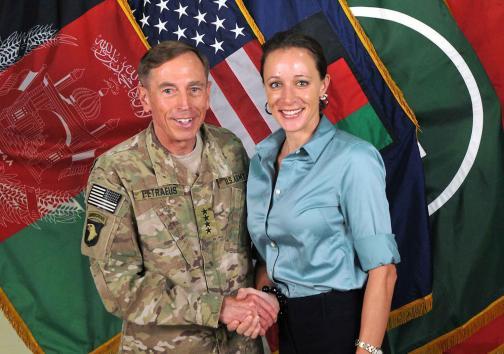 |
In an image from the International Security Assistance Force (ISAF), ISAF Commander General David Petraeus shakes hands with Paula Broadwell in July 2011. Petraeus retired a few months later to become the Director of the Central Intelligence Agency, where he allegedly had an affair with his biographer Broadwell. He resigned on Friday, November 9, 2012 due to the affair. (UPI) |
The ever-widening scandal that took down David Petraeus as the head of the CIA started simply enough when Paula Broadwell, with whom he was having an affair, clicked the “send” button on her email program.
The resulting catastrophic upheaval, or tempest in a teapot (depending on how you see it, which is not relevant to the discussion here), has had many Americans re-examining something they may have taken for granted: their use of email and just how secure and private their messages are -- or aren‘t.
It’s a question that obviously occurred to Petraeus and Broadwell, who took at least one action to protect their communications from prying eyes: They created a shared email account in which messages could be read and written without actually being sent.
Each had access to the account and could write messages, but rather than hit “send” each would put the messages in the “draft” folder to be read by the other.
It‘s a tactic sometimes used by terrorists and pedophiles, but is of little use once an investigation zeroes in on the account holders, as happened when the FBI got involved after Broadwell did, in fact, hit “send” to fling a harassing email at Jill Kelley in Florida.
Could they have done more? Can anyone take more sophisticated actions to protect the contents of an email as it zips around cyberspace through networks and servers on its way to the intended recipient?
Data encryption is an option, and there are many programs out there that will encrypt an email message to make it unreadable by anyone except the person for whom it is intended.
One of the most popular is a program called PGP, for Pretty Good Privacy, which encrypts the message that can then only be unlocked by the recipient using a private “key” of characters previously agreed upon by sender and recipient.
That may be more than something with which most of us would bother unless, of course, we’re trying to hide evidence of an extramarital affair.
And consider this: Since the Petraeus-Broadwell affair has already raised concerns about national security, what would the FBI have made of it had they discovered heavily encrypted messages between the two?
So most of us are likely to go on using email “in the clear.”
Are our digital communications safe? Secure? Private?
Generally, yes. At least for most of us, most of the time, for most of our messages.
But if someone legally or illegally wants to read over your shoulder badly enough, no.
If the FBI presents your Internet service provider with a warrant and asks for access to your email, your secrets will come out.
Best security strategy? Don‘t put secrets in emails.
Or, to recast an old maxim in 21st century terms, don’t put anything in an email you wouldn‘t want your mother to know. (UPI)
<관련 한글 기사>
스캔들, 이메일로 모두 탄로나
CIA 국장인 데이비드 퍼트레이어스와 파울라 브로드웰의 스캔들은 이메일 “보내기” 버튼을 누름과 동시에 세상에 알려졌다.
스캔들 수사와 이메일과 뗄레야 뗄 수 없는 관계를 가지고 있다. 주고 받은 이메일이 얼마나 사적인 내용을 담고 있느냐에 따라 둘의 관계가 정의된다.
퍼트레이어스와 브로드웰이 수사망을 피하기 위해 택한 방법은 공동 이메일 계정을 만들어서 이메일이 실제로 발송되지 않고도 서로의 메시지를 확인하는 방법이었다. 이메일을 써서 보내는 대신 임시보관함에 저장하는 방식이었다.
이는 주로 테러리스트들이 쓰는 방법이다. 그러나 이는 수사가 이메일 계정 보유자를 찾는 쪽으로 집중될 경우 거의 소용없는 방법인 것으로 밝혀졌다. 브로드웰이 플로리다에 있는 질 켈리(Jill Kelley)에게 이메일을 보냄으로써 FBI가 이메일 수사에 착수했다.
퍼트레이어스와 브로드웰이 그 이상으로 더 심혈을 기울일 수는 없었다. 정보 암호화는 기본이다. 암호를 만든 사람 외에는 누구도 암호를 해독할 수 없는 프로그램은 이미 많이 존재한다.
유명한 프로그램들 중 하나는 PGP인데 이는 꽤 괜찮은 사적 영역(Pretty Good Privacy)의 약자다. 이는 문자로 구성된 비밀번호가 있어야만 해독이 가능하다. 이 정도라면 우리가 혼외 관계와 같은 문제를 가지고 있지 않는 이상 충분한 보안능력이라고 볼 수 있다.
디지털 커뮤니케이션은 안전한가? 사적일 수 있는가?
보통은 그렇다. 거의 대부분의 사람들에게, 거의 대부분의 시간에 있어서, 거의 대부분의 메시지의 경우에는.
그러나 누군가 당신의 어깨 너머로 메시지를 훔쳐본다면? 그때는 아닐 것이다.
FBI가 인터넷 공급자를 추적해내고 이메일 계정에 접속한다면 당신의 비밀은 탄로날 것이다.
가장 좋은 보안 전략은? 비밀을 이메일에 넣지 말 것.
21세기 신 격언을 한 마디 하자면, ‘어머니가 알면 안 되는 것은 이메일에 넣지 말라.’ (코리아헤럴드)





![[Exclusive] Hyundai Mobis eyes closer ties with BYD](http://res.heraldm.com/phpwas/restmb_idxmake.php?idx=644&simg=/content/image/2024/11/25/20241125050044_0.jpg)
![[Herald Review] 'Gangnam B-Side' combines social realism with masterful suspense, performance](http://res.heraldm.com/phpwas/restmb_idxmake.php?idx=644&simg=/content/image/2024/11/25/20241125050072_0.jpg)

